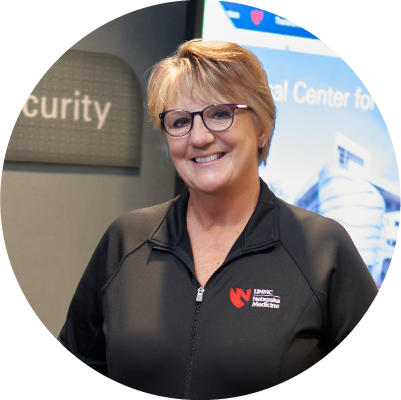Omaha’s Emergency Management and Pandemic Response Hero
By Kamrin Baker
Photo by Ron Coleman, C4 Photography
When people talk about the COVID-19 pandemic, the standard sentiment is: “I can’t wait for this to end.” Things are different for Shelly Schwedhelm, Executive Director of Emergency Management and Biopreparedness at Nebraska Medicine, and Executive Director of UNMC’s Global Center for Health Security.
For Schwedhelm, crisis doesn’t have an expiration date.
“We’ve known what to do since 1918,” she says about pandemic and emergency management. “Sure, there was a little less travel back then, but we’ve learned so much and we’ve created an infrastructure we can lean on.”
Emergency management experts have been writing this playbook for more than a century.
In her roles in the Nebraska healthcare system, Schwedhelm oversees numerous federal grants, and has a plan for it all: natural disaster, cyberattacks, blizzards, bomb threats, you name it. She just happens to have the most experience with novel pathogens.
Schwedhelm and her team led the charge when Nebraska Medicine was confronted with Ebola in 2015, and H1N1 before that. The mobilizing of her staff to train, stockpile and prevent was foundational to their efforts when the Coronavirus landed on America’s doorstep. When it arrived, she organized and delegated one of the country’s first national quarantine centers, partnering with more than 70 federal partners, including the National Guard, Centers for Disease Control and Health and Human Services.
“We were one of the first groups to provide wraparound services for the first Americans who were quarantined, from Wuhan and from the Diamond Princess Cruise Ship,” she says. “We immediately implemented command structures and strategy. There was a lot of staffing, planning, working on data analytics, logistics, making sure stockpiles were OK, the list goes on. Obviously, things continued to evolve, and The Global Center served as a boots-on-the-ground resource in the state’s meat-packing plants, shelters and long-term care facilities.”
Schwedhelm led her people into the belly of the beast, showing up in high-risk environments, leading regular briefings, providing webinars and technical assistance to caretakers in these areas and monitoring breakouts. With 40 years in the field under her belt, Schwedhelm was ready for this pandemic, and her job was to equip as many people as possible with that same knowledge.
“Training is key,” Schwedhelm says. “You need a structure—if you’re activating, you need to be organized and people need to know what they need to do. You know, how do we help people in a meaningful way? I saw the most heroic things happening out there. Nursing leaders at these facilities had RVs in the parking lot because they didn’t want their staff to be alone. The value and the benefit of the work we did saved lives.”
Schwedhelm’s regard for the lives of others is the driving force of her long, illustrious career in medicine. Before her current high-level leadership roles, she held many positions and was responsible for managing operating rooms and surgical services. Her leadership hinges on the relationships she has with colleagues, patients and public health stakeholders.
“Working hard on relationships and moving barriers out of the way has become a way of life,” she says.
“Life is about relationships. Relationships are all there is. Whether you’re on the frontlines or not in crisis, you want people to know you’re good to your word, you’re going to keep them updated and you’re going to be kind.”
The job is certainly not without its challenges. At the beginning of her career, Schwedhelm had to fight sexism in the workplace, proving her capabilities and strengths as a leader.
“I remember one time specifically when I was applying for an OR leadership position—and this was decades ago—an anesthesia chairperson said to me: ‘With four children, how will you ever be successful at this job?’ My response was: ‘Watch me,’” she says.
Schwedhelm encourages young women beginning their careers in health care to find trusted mentors and to speak up for themselves. She describes herself as a good coach, someone who is open to new ideas, ready to support and listen to her team.
Christopher Kratochvil, M.D., serves as an Executive Director of the Global Center for Health Security alongside Schwedhelm and sings her praises. “Her leadership has been incredible, leading by example as she rolls up her sleeves to get done what needs done, and setting the stage for team members to be successful,” Kratochvil says. “It is no exaggeration to say that our organization, community, state and country are safer because of the work Shelly has done and continues to do.”
While her internal support has strengthened over the years, the recent public pushback against science, such as mask-wearing and vaccines, has added an entirely new level of exhaustion to her work. She says it’s resilience-building, but she is still fearful for frontline workers and for vulnerable populations—especially her grandchildren, who are currently ineligible for the COVID-19 vaccine.
“Back in the beginning, people looked at health care workers as heroes—but it’s not like that anymore,” Schwedhelm says. “We’re having conversations like, ‘What is self care?’ and then immediately saying: ‘Can you pick up another shift?’ It’s never enough, and there’s not enough time. You don’t see the end. That part is pretty humbling.”
Still, she makes time for herself. Schwedhelm lives on a farm in North Omaha with her husband, a retired nurse, and she finds peace working on the farm and trailriding with her horses. She also cherishes time she can spend, safely, with her nine grandchildren.
“The end game is saving lives, and ultimately, recovering from an event of this magnitude,” she says. “It’s not over. We have to keep planning. We have to keep thinking about what comes next.”
No matter the threat, Schwedhelm refuses to back down. Her life’s work is teaching others to face the music with the same level of confidence and care. “You protect me,” she says. “I protect you.”

